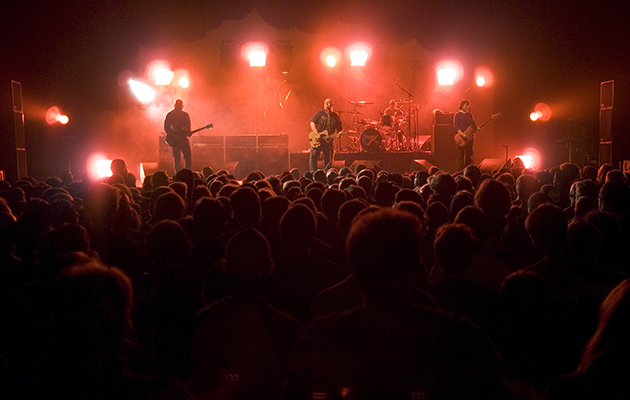“I wasn’t searching to sound like anything,” he says. “I just knew what not to sound like – no way am I going to sound like that, or that, or that. It found its way to something.”
Thompson’s lyrics, meanwhile, had few precedents. Surrealist films, and their contemporary offspring David Lynch, with their subconscious-plunging disjunctions, had impressed him when studying film, and he led the Pixies on regular cinema trips, seeing Eraserhead eight times. The Bible and stray, transfigured fragments of his own life provided the content, throwing up images of shattered bones, reincarnated spirits and filthy, incestuous sex.
The communal ideals of the indie scene were not part of his thinking. “He wasn’t a lefty,” recalls Gary Smith. “He didn’t seem to have the same sense of social responsibility as everyone else I knew. He didn’t want to change how things were.”
“I just didn’t question anything,” Thompson affirms. “I didn’t question the lyrics or the sound. I didn’t try to present any particular angle or philosophy; it wasn’t about trying to represent our generation. It was more escapist and art-gallery. Making pretty pictures, or ugly pictures, and framing them. It was high art. We were an art-house band.”
Soon they were gigging around Boston. During a soundcheck in the dingy basement of the Rathskeller club, supporting fellow Boston mavericks the Throwing Muses, with whom they’d be briefly entwined, Gary Smith saw them for the first time, and witnessed the Pixies’ other devastating weapon: Thompson’s scream.
“I was like, ‘Holy Jesus, look at this guy!'” Smith says, the memory still alive. “He looks like a regular college guy, and that was coming out of his mouth, and bits and pieces in Spanish, like The Exorcist. How could he seem so possessed, and then so normal? I have no idea what allows the human psyche to compartmentalize those types of things. There was something extraordinary coming out of seemingly ordinary people, like they were channeling something. They had this insanity to what they were doing, which came out like from the nozzle of a hose, and then managed to rein it back in during the verse. No-one then lost it the way they lost it. It’s hard for kids hearing them now to understand the amount of control in the world before the Pixies. Even The Clash was controlled. Charles seemed to have a shaman’s ability to find that place where loss of control could happen. These guys went to a different realm.”
Smith was in a successful local band of his own, Lifeboat, had just started working at Boston’s Fort Apache studios, and had made demos that had helped the Muses get signed by Britain’s 4AD. He was desperate to record what he’d seen, and the Pixies were delighted at the chance. As was Smith’s custom then, he got Thompson to visit his house and record rough demos with a guitar while he cooked pasta. Now available on CD, Thompson sounds giddily thrilled at the memory of these early makeshift recordings.
“It’s this excitement when you’re part-man, part-boy,” he gushes. “It was a dream that I was going to do when I was grown up. So it was like, ‘I’m not just a kid any more. I’ve got a band. And I’ve gotta sing. And here we go.'”
A day after these recordings, the band arrived at Fort Apache studios. It was a cavernous, abandoned warehouse with minimal heat. They dressed in parkas and wore gloves to play; steam came out of their mouths as they sang. They worked for three days and nights, taking turns to sleep on the floor, Smith yanking them awake when they were needed. “There were no amphetamines, coke, not even pot,” he recalls. “But we ended up getting into odd states in that room, deprived of sleep and full of adrenaline. It’s evident in the tracks.”
What became known as the Purple Tape was the Pixies’ tablet of stone, a bare, brutal work they would mine for years. There was a jerky playfulness to it, and something truly unearthly in Thompson’s echoing, girlish singing on “Caribou”. Violent and melodic, its recording laid the seed for the US punk underground’s re-entry into pop’s mainstream. The day it was finished, Thompson changed his stage name to Black Francis. Kim Deal became Mrs John Murphy (Murphy was her husband).
“That 17-song tape was earth-shattering,” Smith states. “It made you realise that the world was not the place you thought it was. It seemed to me to be some new invention, like electricity. It seemed like it came from a place that was not about craft; that was about inspiration. I had every intention to make sure that the world was changed by the Pixies in exactly the way they were offering. I sent the Purple Tape to every single person I’d met on tour, even people I thought would detest it.”
The Throwing Muses, meanwhile, were equally impressed. Their singer Kristin Hersh begged their manager Ken Goes to take them on. Goes passed the tape to 4AD boss Ivo Watts-Russell in London. He liked it but was sniffy about rock for a label then defined by the ethereal Cocteau Twins. Persuaded by the label’s publicist Deborah Edgeley, he signed them.


